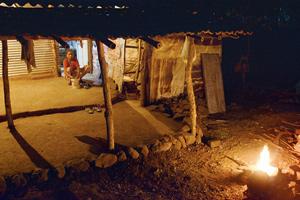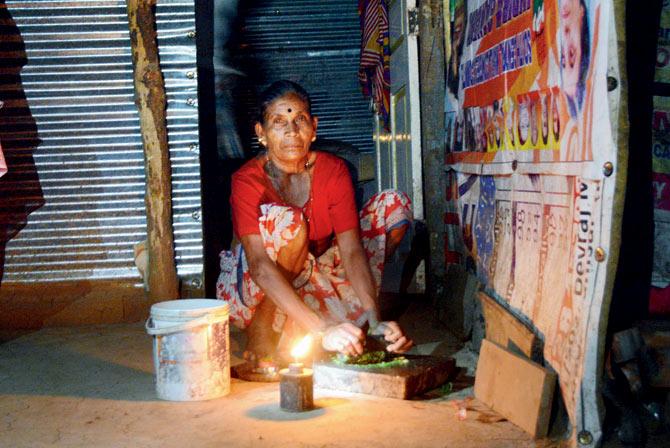In the second of our four-part series on electrification, the city shines light on the perilous lives of adivasis in SGNP who live in perennial fear


Banusari Kirkee, like many other residents, uses an illegal electricity line so her children can study. Pic/Satej Shinde
ADVERTISEMENT
Tribal families in Sanjay Gandhi National Park (SGNP) have been living here for many generations before the rest of the citizens even began migrating to Mumbai. And yet, over the years, they have watched the rest of the city light up with development and progess, while their own homes remained plunged in darkness.
Unfortunately, times are only set to get darker for them, with the authorities now planning to oust them from their ancestral homes. SGNP is celebrated as a rare national park that exists within city limits, but for its tribal residents, they might as well be hundreds of miles away and centuries behind the rest of the city. The park gates are at the heart of Borivli, but go in just 10 km, and you'll find the 11 tribal hamlets - Ravan pada, Kelda pada, Dam pada, Rajni pada, Chesse pada, Tumri pada, Tale pada, Mala pada - living in the dark ages.

Banusari Kirkee took an illegal electricity connection so the children in her family can study. Pics/Satej Shinde
Deep in Ravan pada
mid-day visited one of these hamlets, Ravan Pada, on Thursday night, around 10 pm. The first thing that struck our reporters was that the residents were all on edge. Talking to them gave a sense of their fear in the wake of leopard attacks in the area. Most people follow an unofficial curfew after sundown, to avoid an encounter with the big cats.
Most of the pada was dark, except for a sprinkling of a bulb or two outside some of the huts. These lights too are powered by illegal connections stolen from the electricity line to government quarters and offices inside SGNP. Ironically, there is a legal power line to the park authorities' premises, and only the tribal homes are left in the dark. Locals added that they were given solar lamp posts by an NGO, but those don't work in the monsoon.

It takes courage to walk in the dark forest inside Sanjay Gandhi National Park, with leopards on the prowl
'We can't leave our home'
One of the residents, Chander Paule, said that to the best of his knowledge, his family has been living there for seven generations, and they even had 1.5 acres of farmland there. When the national park was formed, Paule and many others lost all their farmland and their main source of livelihood. Paule's hut is among those that has electricity, but he told us that he had taken an illegal connection so his children can study.
It's the same story with Banusari Kirkee, who ate her dinner in the dim light of a candle while lamenting the state of her home. "My house is in bad shape; the walls are plastic. My house collapsed in the rains last year, and I have been trying to build it back up. I have an illegal power line so the children can study. When we complain or demand anything, the officials simply tell us that we are free to leave. But where will we go? This is our home," said the senior citizen.
Most of the tribals have voter and ration cards to show they are bonafide residents of padas within SGNP, but the government has still not given them basics like electricity. Many of the residents even work for the SGNP authorities, providing services like gardening. Others, like third-generation resident Mukesh Rathod, are now forced to look for work outside the park.
Johnny Waike, a social activist, said, "We have met MLAs and MPs who are supportive, but bringing power inside these homes is only possible with government approval. The locals have requested the government several times for proper facilities, as well as protection from animal attacks, but officials merely asked them to leave if they have a problem."
Also Read: Batti Gul: 400 Tribal Homes In Maharashtra's Gorai Sink Into Darkness Every Night
 Subscribe today by clicking the link and stay updated with the latest news!" Click here!
Subscribe today by clicking the link and stay updated with the latest news!" Click here!






